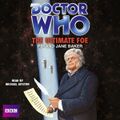The Ultimate Foe (novelisation): Difference between revisions
Vincent VG (talk | contribs) (Adding categories) |
|||
| Line 106: | Line 106: | ||
[[Category:Stories set in the Rassilon Era]] | [[Category:Stories set in the Rassilon Era]] | ||
[[Category:The Trial of a Time Lord Collection novels]] | [[Category:The Trial of a Time Lord Collection novels]] | ||
[[Category:Target novelisations with audiobook readings]] | |||
Revision as of 07:24, 7 August 2020
The Ultimate Foe was a novelisation based on the 1986 television story The Ultimate Foe.
Publisher's summary
Snatched out of time and space and brought before the Time Lords on Gallifrey, the Doctor is on trial for his life.
While the Doctor asserts that the evidence of the Matrix, the repository of all Time Lord knowledge, has been tampered with, the mysterious and vengeful prosecuting council, the Valeyard, is confident that the Doctor will be sentenced to death.
In a dramatic intervention the Valeyard's true identity is revealed but he escapes from the courtroom into the Matrix, and it is into this nightmare world that the Doctor must follow – to face his ultimate foe ...
Chapter titles
- Prologue
- The Key of Rassilon
- An Unwelcome Intruder
- Evil Intent
- Twelve-and-a-half
- Treason
- A World Apart
- A Lethal Greeting
- Mr Popplewick
- A Sticky End
- To Be Or Not To Be
- Out of the Frying Pan
- The Baiter Bitten
- False Witness
- Off With His Head
- Mesmeric Riches
- Point and Counterpoint
- About-face
- Two-faced
- Double-faced
- Particles of Death
- The Price of Vanity
- The Keeper Vanishes
- Catrot Juice
- Epilogue
Deviations from televised story
- The Master states that: "The Valeyard, Doctor, is your penultimate reincarnation... Somewhere between your twelfth and thirteenth regeneration". In the televised show, the line is: "The Valeyard is an amalgamation of the darker sides of your nature, somewhere between your twelfth and final incarnation." Since, in the novel, the Valeyard is an actual Doctor incarnation (like the Sixth Doctor), and not a "dark side" of the Doctor (like the Dream Lord or the actual Valeyard), it's unclear as to what he could possibly gain from killing the Doctor and taking all his regenerations without causing a paradox.
- Glitz initially mistakes the Valeyard for the Doctor's brother, noting that they possess similar facial features.
- The Inqusitor's place at the trial is noted to be part of her ambitious career. To preside over such an important inquiry would earn her a seat on the High Council, but the unusual nature of the Master's interference has jeopardised those prospects.
- The Court is permitted to watch the Doctor's first entry to the Matrix unfurl as they had with the events on Ravolox, Thoros Beta and aboard the Hyperion III.
- Maintainance of the Matrix is delegated to the Elzevirs, inhabitants of Leptonica in the constellation of Daedalus. Specialists in delicate micro-technology, the supervisor of the supercomputer repair team, Nilex, was hypnotised by the Master who used the opportunity to make a duplicate Key of Rassilon.
- The novelisation features an epilogue aboard the TARDIS between the Doctor and Mel. Despite her eagerness to travel with him, he points out to her that she must be returned to where she was abducted in order to maintain the continuity of time. Mel departs to the surface of Oxyveguramosa, where she reunites with her Sixth Doctor. The story goes on to state that the Doctor would experience a series of adventures that would culminate in a confrontation with the Rani.
Writing and publishing notes
- to be added
Additional cover images
Unused jacket painting by Alister Pearson, 1988
British publication history
- Hardback (April 1988)
- W.H.Allen & Co. Ltd. UK ISBN:0491031068, copies priced £7.95)
- Paperback (September 1989)
- Target / W.H. Allen & Co. Ltd. One single paperback edition, estimated print run: 23,000, priced £1.99 (UK).
Audiobook
This Target Book was released on 3 October 2013 complete and unabridged by BBC Audio and read by Michael Jayston as part of The Trial of a Time Lord Vol. 2.
The cover blurb and thumbnail illustrations were retained in the accompanying booklet with sleevenotes by David J. Howe. Music and sound effects by Simon Power.



